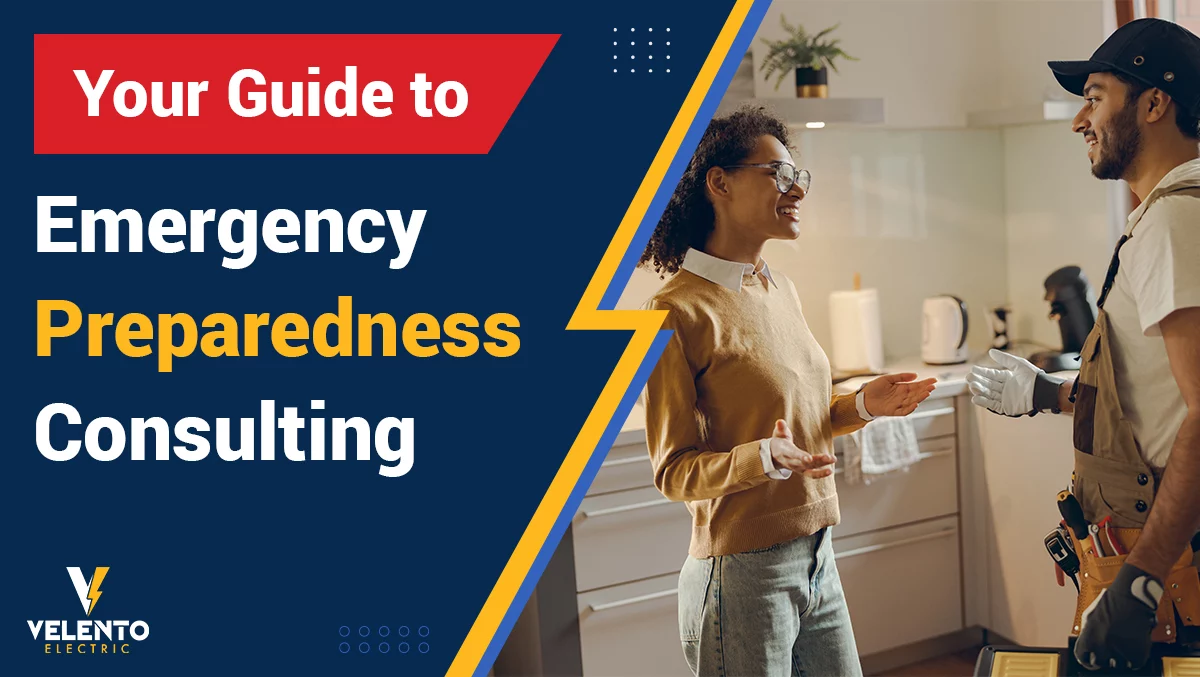Introduction: Why Emergency Preparedness Is No Longer Optional
Floods. Fires. Cyberattacks. Power outages. Pandemics.
Emergencies can strike without warning, and their consequences are often severe—especially for those caught unprepared. Whether you own a home, manage a business, or lead a facility, having a well-defined emergency plan isn’t just smart—it’s essential.
That’s where emergency preparedness consulting steps in.
This guide walks you through the purpose, process, and value of partnering with experts who can help you prepare for the worst—and recover fast when it happens.
🔍 What Is Emergency Preparedness Consulting?
Emergency preparedness consulting is a professional service that helps individuals, families, businesses, and institutions develop, implement, and test customized response plans for a wide range of emergencies.
These consultants assess vulnerabilities, design mitigation strategies, and ensure your people, property, and operations are ready to face unexpected disruptions.
Core Objectives of Emergency Preparedness Consulting:
✅ Identify potential threats specific to your location or industry
✅ Build detailed emergency response and evacuation plans
✅ Ensure regulatory and insurance compliance
✅ Reduce downtime and operational risk
✅ Protect lives, data, and physical assets
🧠 Why You Need an Emergency Preparedness Consultant
Emergency response isn’t something you should figure out during a crisis. Without a pre-established strategy, your chances of protecting assets, lives, and business continuity drastically decrease.
Key Reasons to Invest in Consulting:
✅ Objectivity & Expertise: Consultants identify overlooked vulnerabilities.
✅ Customized Plans: No cookie-cutter templates—tailored to your risks.
✅ Training & Drills: Ensure your team knows what to do when the alarm sounds.
✅ Faster Recovery: Effective planning shortens downtime dramatically.
✅ Compliance: Meet OSHA, NFPA, FEMA, and insurance requirements.
Whether it’s a family residence, hospital, school, or retail chain, emergency preparedness saves time, money, and lives.
🏡 For Homeowners: Safety Starts with a Plan
Many people assume emergency planning is only for large organizations, but every household should have a basic preparedness strategy. Disasters can isolate families, cut off power, and leave communities without services for days or weeks.
Consultants Help Homeowners:
✅ Identify fire, flood, and power outage risks
✅ Create customized family evacuation plans
✅ Develop emergency communication protocols
✅ Build emergency supply kits
✅ Prepare medical and pet safety procedures
Home preparedness plans reduce panic and help you respond with clarity when every second counts.
🏢 For Businesses: Emergency Plans Protect Profits and People
For businesses, an unplanned emergency can lead to:
- Costly downtime
- Breached data
- Lost inventory
- Injured employees
- Reputational damage
An emergency preparedness consultant evaluates operational weak points, ensures regulatory alignment, and builds a resilience roadmap that keeps your business running—even under duress.
Typical Business Services Include:
✅ Business Continuity Planning (BCP)
✅ Emergency Action Plans (EAP)
✅ Cyberattack & ransomware response strategies
✅ Physical security risk assessment
✅ Employee training and safety drills
Small businesses especially benefit from consulting, as they often lack in-house risk management expertise.
🔐 Components of a Strong Emergency Preparedness Plan
Emergency preparedness is more than fire drills and first aid kits. It’s a layered, strategic process covering before, during, and after a crisis.
A Consultant Typically Builds Plans That Include:
- Risk & Vulnerability Assessment
Analyze threats based on location, industry, and structure.
- Emergency Action Protocols
Clear step-by-step response for fire, natural disasters, medical emergencies, and intrusions.
- Communication Plan
How internal and external stakeholders are notified—quickly and clearly.
- Evacuation & Shelter-in-Place Plans
Site maps, exits, and safe zones based on real layout.
- Training & Drills
Educating your team on procedures and testing their readiness.
- Continuity & Recovery Plans
How operations resume—systems, staffing, suppliers, and service restoration.
✅ A robust plan also includes regular updates, contact directories, and backup locations.
🛠️ Tools Used by Emergency Preparedness Consultants
Today’s consultants rely on more than clipboards and checklists. They use cutting-edge tools to simulate emergencies, model risk, and deliver scalable, dynamic plans.
Common Tools & Tech:
✅ Digital risk assessment software
✅ Geographic Information Systems (GIS)
✅ Remote monitoring and alert systems
✅ Cloud-based plan storage
✅ Training apps and virtual simulations
✅ Cybersecurity audits and response protocols
These tools allow for data-backed decisions and real-time updates, keeping your strategy aligned with evolving threats.
🧾 Compliance, Legal, and Insurance Considerations
Ignoring emergency preparedness can have legal and financial consequences, especially for businesses.
Consultants Ensure:
✅ OSHA and NFPA compliance for workplace safety
✅ ADA considerations in evacuation and response plans
✅ Data protection and recovery protocols (especially under HIPAA, GDPR, or PCI DSS)
✅ Proof of risk mitigation to lower insurance premiums
✅ Faster insurance claims with documented readiness
In the event of a disaster, having a plan on record shows insurers, regulators, and clients you took reasonable precautions.
🧩 The Role of Emergency Preparedness in Cybersecurity
Many overlook that not all emergencies are physical. Cyberattacks, data breaches, and ransomware can cripple operations.
Consultants now integrate cyber preparedness as part of their offering—especially for healthcare, finance, and e-commerce industries.
Cyber-Preparedness Elements:
✅ Incident response playbooks
✅ Communication protocols for internal and public notification
✅ Backup and recovery testing
✅ Secure access management and breach containment
✅ Employee phishing and awareness training
Your business’s digital resilience is now just as important as its physical security.
👨👩👧👦 Family and Community Preparedness: Why It Matters
When communities plan together, everyone is safer. Emergency preparedness consulting can also support:
- Homeowners’ associations (HOAs)
- Apartment complexes
- Senior living facilities
- Schools and daycares
Community-Based Preparedness Includes:
✅ Mass notification systems (texts, calls, sirens)
✅ Shared emergency supplies and shelters
✅ Evacuation plans for vulnerable residents
✅ Emergency role assignments (e.g., first aid, communication)
Consultants work with these groups to promote shared responsibility and rapid coordination in a crisis.
💬 What to Expect When You Hire a Consultant
Hiring an emergency preparedness consultant involves more than handing over a checklist. It’s a collaborative process that builds long-term resilience.
A Typical Consulting Process:
- Initial Consultation & Site Walkthrough
- Risk & Vulnerability Analysis
- Customized Plan Development
- Team Training & Simulation Exercises
- Documentation & Compliance Filing
- Ongoing Support & Plan Updates
✅ Many consultants also offer retainer services—providing quarterly reviews, drills, and on-call response guidance.
💡 Common Myths About Emergency Preparedness—Debunked
Many people delay preparedness because of misconceptions. Here are the most common myths:
❌ Myth 1: “It Won’t Happen to Me”
Truth: Disasters strike without discrimination—location and industry are no guarantee.
❌ Myth 2: “We Can Figure It Out When It Happens”
Truth: In a crisis, there’s no time for improvisation. Delays cost lives and revenue.
❌ Myth 3: “Insurance Will Cover Everything”
Truth: Insurance pays for losses—but can’t undo business downtime or reputational harm.
❌ Myth 4: “A Fire Drill Is Enough”
Truth: Modern threats require comprehensive planning for cyber, medical, and operational incidents.
📈 Case Studies: How Preparedness Changed the Outcome
🏢 Case 1: Retail Chain Avoids Fire Catastrophe
A mid-sized retailer in New Jersey had emergency plans created six months prior to an electrical fire. Staff evacuated in 2 minutes. Inventory was protected. Business resumed in 48 hours. Without a plan? The outcome could’ve been tragic.
🏥 Case 2: Medical Office Thwarts Cyberattack
A dental practice was targeted by ransomware. Thanks to a consultant’s pre-built cyber response plan, they restored backups, notified patients ethically, and avoided ransom payments.
🏠 Case 3: Suburban Family Escapes Wildfire
A family had an evacuation map, emergency go-bags, and a meetup plan thanks to a community preparedness consultant. They left safely with critical documents and pets.
🧭 How to Choose the Right Emergency Preparedness Consultant
Not all consultants are created equal. Look for professionals with:
✅ Proven experience in your industry
✅ FEMA or OSHA training certifications
✅ Strong references and case studies
✅ Clear communication and collaborative approach
✅ Availability for ongoing support
Ask if they provide both digital and printed plans, training modules, and compliance documentation.
📅 When Should You Hire a Consultant?
The best time to prepare is before a disaster hits. But even if you’ve already experienced an incident, it’s not too late to strengthen your strategy.
Ideal times to hire include:
✅ After moving into a new home or building
✅ When launching or expanding a business
✅ During annual risk audits or insurance renewals
✅ After experiencing an emergency or near-miss
✅ When regulations change or new threats emerge
Proactive planning pays dividends in stability and peace of mind.
🧰 Building Resilience into Everyday Operations
Emergency preparedness isn’t a one-time project—it should be embedded into your day-to-day operations and culture. This is especially important for businesses and institutions where even small disruptions can escalate quickly.
How to Operationalize Preparedness:
✅ Include emergency protocols in onboarding and HR training
✅ Make emergency drills part of your annual operational calendar
✅ Set up visible signage and QR-code-linked safety plans
✅ Review backup systems (power, data, equipment) quarterly
✅ Ensure facilities staff conduct monthly risk checks (e.g., exits, alarms, generators)
By operationalizing preparedness, you create an organization that doesn’t just react under pressure—it responds with intention.
🔁 Integrating Preparedness into Facility Design and Upgrades
One of the most overlooked areas in emergency readiness is facility design. Consultants often work with architects, builders, and safety officers to create infrastructure that enables swift response and safe evacuation.
Design Enhancements That Improve Preparedness:
✅ Clearly marked emergency exits with LED lighting
✅ Fire-rated stairwells and smoke barriers
✅ Accessible egress routes for elderly or disabled occupants
✅ Backup power systems (UPS and generators)
✅ Weather-resistant data closets and server racks
✅ On-site shelters or safe rooms for high-risk zones
Even during renovations or relocations, your emergency consultant can advise on best practices to future-proof your physical space.
🧭 Evaluating Risk Based on Geographic Location
Every region faces unique natural and man-made threats. That’s why consultants tailor emergency preparedness plans based on localized risk profiles.
Geographic Factors Consultants Analyze:
✅ Coastal areas – flooding, hurricanes, saltwater corrosion
✅ Urban zones – civil unrest, grid overload, transport accidents
✅ Rural areas – wildfire, isolation, longer response times
✅ Cold regions – blizzards, frozen pipes, generator dependency
✅ Seismic zones – earthquakes, building collapse protocols
A professional plan accounts not only for general hazards but also for those most likely to affect your address. This precision ensures your plan isn’t generic—it’s personal and effective.
📲 Mobile-Ready Emergency Plans: The Digital Advantage
In a real crisis, no one has time to flip through binders. That’s why many consultants now deliver mobile-accessible plans through secure apps or cloud portals.
Mobile Preparedness Features:
✅ One-click access to evacuation routes
✅ Emergency contact lists synced to your phone
✅ Push notifications and SMS alerts
✅ Geo-tagged emergency supply locations
✅ Live updates from leadership or crisis coordinators
Whether you’re at your desk or offsite, a mobile plan ensures real-time decision-making—turning confusion into clarity.
🧠 Psychological Preparedness: Mental Resilience Matters
Emergencies are traumatic—not just operationally, but emotionally. Preparedness consultants are increasingly collaborating with psychologists and HR teams to include mental resilience protocols in their planning.
Emotional Preparedness Includes:
✅ Psychological first aid training
✅ Mental health support after traumatic events
✅ Scripts and guidelines for calm communication
✅ Coping strategies for stress and loss
✅ Employee wellness re-engagement programs post-disaster
This human-centered approach fosters faster emotional recovery and strengthens workplace trust—even under crisis conditions.
🎓 Certification and Professional Credentials to Look For
When hiring a consultant, their background matters. Not all professionals offering “emergency services” have the same credentials. Look for those certified by reputable national or international organizations.
Trusted Credentials Include:
✅ Certified Emergency Manager (CEM) – recognized globally
✅ FEMA ICS/NIMS certifications – required for public safety work
✅ NFPA or OSHA training – critical for code compliance
✅ CPGP (Certified Professional in Governance & Preparedness)
✅ Business Continuity Institute (BCI) certifications
These indicate that the consultant is up to date with laws, methodologies, and tactical procedures in the preparedness space.
📦 Emergency Supply Chain Planning
One crucial, often-forgotten element of preparedness is your supply chain. What happens if your vendors can’t deliver due to a disaster? Consultants help you develop a continuity plan to keep your inventory, logistics, and partners running—even under pressure.
Key Steps in Supply Chain Resilience:
✅ Identify alternative suppliers in advance
✅ Store critical inventory onsite for 7–14 days
✅ Digitize inventory and vendor contact lists
✅ Negotiate emergency delivery clauses in contracts
✅ Establish offsite staging areas for goods in transit
Supply chain breakdowns are among the first ripple effects in a disaster. A strong plan minimizes downtime and maintains delivery commitments.
🧭 Specialized Consulting for High-Risk Industries
Some sectors require deeper, more rigorous preparedness protocols due to the critical nature of their services or the vulnerabilities they manage.
Consultants Specialize in:
🏥 Healthcare – emergency patient relocation, power redundancy, triage drills
🏫 Education – active shooter response, lockdown procedures, parent notification systems
🏭 Manufacturing – hazardous material spills, equipment failure protocols
🏢 Data centers – climate control, UPS power, server protection
🛫 Transportation – logistics rerouting, passenger management, TSA collaboration
These environments demand sector-specific knowledge, ensuring emergency plans don’t just meet generic standards—but exceed them.
📋 Annual Review: Why Updating Your Plan Is Non-Negotiable
A plan is only useful if it’s current. That’s why consultants emphasize yearly reviews—to accommodate new risks, team changes, facility upgrades, and technology updates.
Annual Update Checklist:
✅ Review contact lists and emergency roles
✅ Reassess threats based on recent events
✅ Check the availability and condition of supplies
✅ Update documentation to meet new regulations
✅ Schedule and complete at least one live drill
Businesses and homes grow, change, and relocate. Your emergency plan should evolve with you.
📝 Conclusion: Don’t Wait for a Crisis to Start Preparing
Emergencies are unpredictable—but your response doesn’t have to be.
Emergency preparedness consulting equips you with a plan, a team, and the tools to take control when it matters most. Whether you’re safeguarding your home, protecting your employees, or ensuring business continuity, the right guidance can mean the difference between chaos and control.
📣 Ready to Prepare?
Don’t leave your safety to chance.
Book a consultation with an emergency preparedness expert and build a resilient plan tailored to your unique needs.
✅ Protect your people
✅ Safeguard your assets
✅ Ensure rapid recovery
✅ Comply with regulations
Preparation isn’t fear—it’s empowerment.












